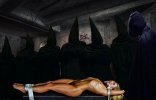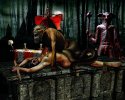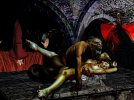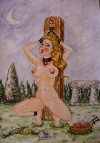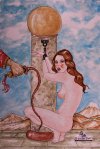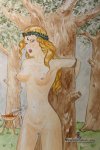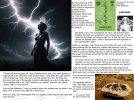-
Sign up or login, and you'll have full access to opportunities of forum.
You are using an out of date browser. It may not display this or other websites correctly.
You should upgrade or use an alternative browser.
You should upgrade or use an alternative browser.
Stretched On The Altar...
- Thread starter Eulalia
- Start date

2BontheRack
Spectator
I like this do you have other fantasies to share ?This is me stripped naked and ready to be sacraficed in public.
A very “budget” (poor) version of the altar...View attachment 1268473 on the sacrificial altar
averagecrossenjoyer
Guard
an aztec sacrifice scene from jojo's bizzare adventure
Stilet2
Governor
For pretty well all of us, I guess, our first encounter with imagery and accounts of Crucifixion
was in the context of Christian religious teaching, art and ritual, in which the idea of Sacrifice is central.
As a young adolescent, kneeling during the Offertory, I'd imagine myself being led up the aisle,
laid on the altar, my naked body lifted up and displayed, my blood poured out ...
Wicked, blasphemous thoughts!Not long ago, I'd surely have been burnt at the stake!
But the idea of (being a) human sacrifice is closely enmeshed with my fascination with the Cross.
It's seems a while since I did much to justify the title of 'Poet Laureate',
so I'm going to post a longish poem about (being a) pagan sacrificial victim.
It's seasonal, Lughnasadh (say "lunar saw") being August 1st,
traditional start of the harvest (Lammas, 'loaf-Mass', in English).
I've drawn on bits and pieces of Celtic mythology and Scottish folklore,
but it doesn't pretend to historical or archaeological accuracy.
There are footnotes mainly geekish,
but they also give a rough guide to how the Gaelic names are pronounced.
Wonderful, unique, the best poem!
I love it.
But ... tell me please a little bit more about "be ploughed and sown, cut and threshed, crushed with the stone, burnt".
I undearstand that:
be ploughed - the ploughshare in her vagina or (maybe) anus;
be cut - cutting her breasts, labia, clitoris, and (this is the first question) - is that mean cutting her abdomen and extracting her guts?
be threshed - beating by a flail, until her bones broken;
"be crushed with the stone" - means "grinding her broken arms and legs with the millstone", isn't it?
"be burnt" - be roasted alive.
But, what does mean "be sown"? If it means to be fucked and sown with male semen, then this action should be after the ploughing?? (The second question).
Well, one of the bits of folklore that I had in mind when I was writing that was the ballad of John Barleycorn - many versions in Scotland and England, notably one by Rabbie Burns - in which 'John Barleycorn' is treated in all the ways a grain of barley is in the process of turning into whisky or beer. And also The Wicker Man (the 1973 film has lots of scenes in Eul's home territory!). So at the end of my poem I'm being sacrificed in a similar sort of way - I deliberately left it a bit misty, exactly what's being done to me, readers can imagine for themselves, and you've come up with likely interpretations - and, yes, 'ploughed and sown' hints at ritual rape.Wonderful, unique, the best poem!
I love it.
But ... tell me please a little bit more about "be ploughed and sown, cut and threshed, crushed with the stone, burnt".
I undearstand that:
be ploughed - the ploughshare in her vagina or (maybe) anus;
be cut - cutting her breasts, labia, clitoris, and (this is the first question) - is that mean cutting her abdomen and extracting her guts?
be threshed - beating by a flail, until her bones broken;
"be crushed with the stone" - means "grinding her broken arms and legs with the millstone", isn't it?
"be burnt" - be roasted alive.
But, what does mean "be sown"? If it means to be fucked and sown with male semen, then this action should be after the ploughing?? (The second question).
https://www.bbc.co.uk/arts/robertburns/works/john_barleycorn_a_ballad/
And several song versions have been done - the ones I know of are by Fairport Convention, Jethro Tull, and (likely the most famous) by Traffic. In fact, Traffic (headed at the time by Steve Winwood) had an album called "John Barleycorn Must Die". It's quite good, and features almost 1 crucified slave girl named Eulalia (okay, zero really, but it is still a good album).in which 'John Barleycorn' is treated in all the ways a grain of barley is in the process of turning into whisky or beer.
ledoux
Governor
Stilet2
Governor
Well, one of the bits of folklore that I had in mind when I was writing that was the ballad of John Barleycorn - many versions in Scotland and England, notably one by Rabbie Burns - in which 'John Barleycorn' is treated in all the ways a grain of barley is in the process of turning into whisky or beer. And also The Wicker Man (the 1973 film has lots of scenes in Eul's home territory!). So at the end of my poem I'm being sacrificed in a similar sort of way - I deliberately left it a bit misty, exactly what's being done to me, readers can imagine for themselves, and you've come up with likely interpretations - and, yes, 'ploughed and sown' hints at ritual rape.
https://www.bbc.co.uk/arts/robertburns/works/john_barleycorn_a_ballad/
Perhaps, you will be surprised, but I have been learning Robert Burns and (among other things) his poem about John Barleycorn in school
 )))) Of course, I have recalled it only now
)))) Of course, I have recalled it only now  ))))
))))Stilet2
Governor
Well, one of the bits of folklore that I had in mind when I was writing that was the ballad of John Barleycorn - many versions in Scotland and England, notably one by Rabbie Burns - in which 'John Barleycorn' is treated in all the ways a grain of barley is in the process of turning into whisky or beer. And also The Wicker Man (the 1973 film has lots of scenes in Eul's home territory!). So at the end of my poem I'm being sacrificed in a similar sort of way - I deliberately left it a bit misty, exactly what's being done to me, readers can imagine for themselves, and you've come up with likely interpretations - and, yes, 'ploughed and sown' hints at ritual rape.
https://www.bbc.co.uk/arts/robertburns/works/john_barleycorn_a_ballad/
By the way, there is (IMHO) very interesting artist on Deviant: DominiGori, who have a lot of work about Neolithic sacrificing rituals.
https://www.deviantart.com/dominigori/gallery?q=sacrifice
(I post the link with pre-prepared searching by word "sacrifice", but you can watch also his another work)
For example, the one of his works (the pic and the text):
Prepared for sacrifice. (Europe, 700 BC)
Based on recent archaeological research, the illustration recreates one of these ceremonies, held in one of these megalithic monuments - originally erected in the fourth millennium BC - in a much later period, already in the Iron Age (700 BC), within the framework of the Celtic cultures of Atlantic Europe. To prepare for a ritual sacrifice, the druids have chained a young maiden to a consecrated oak post, on which a triskel has been engraved as a symbol of eternal renewal.
The young victim has been - ritually - turned into a slavegirl (hence the necklace she wears). For this, the eldest druid paid her father a symbolic price for her (a basket of eggs). Although being chosen for sacrifice was considered a great honor (both for the young woman and her family), the ceremony could not be held while she was a free young maiden, since then her family would be obliged to avenge her. For this reason, by being sold symbolically, the young woman was transformed into a true slavegirl and was from then on considered only as an animal destined for sacrifice (similar to a sheep or a heifer).
All sources indicate that -without a doubt- they had an orgiastic and bloody character. Apparently, the participants took various types of hallucinogenic concoctions until they reached a state of intense trance, which wildly excited their most intimate and perverted desires and freed them from all restraints or moral limits. At the height of the celebration, the young and innocent maidens were savagely defiled and -turned into helpless sex toys- forced to sexually satisfy all attendees (usually several dozen). But since they were also made to drink an aphrodisiac potion, these girls destined for sacrifice screamed and moaned like crazy with pleasure while they were raped, offering themselves -like hot bitches in heat- their bodies to the eager and wild men who assaulted and dilated all their orifices in a bestial and promiscuous way. Possessed in their trance by the spirit of different animals, groups of excited druids took turns (or competed) to penetrate the beautiful girls and pour their fertile seed (howling and moaning like wolves or pigs, etc.) into the depths of their wombs; although some -unable to contain themselves- forced the maidens' mouths to give themselves pleasure (forcing them to drink their thick liquor), festively splashing their faces and breasts. There was no shortage of volunteers who -simultaneously- sodomized the excited girls, so that they satisfied the men in groups, at least three by three.
For their part, the druid women (also completly intoxicated), excited the men and copulated with them, but ensuring that -in the end- they all ejaculated inside (or on) the bodies of the young women. They also made themselves satisfied by the girls, forcing them to lick their sex and emptying their fluids into their overflowing mouths. Only at the end, when the young women had been completely humiliated and prostituted, did the real sacrifice begin and the delicate skin of the victims was marked and slowly burned with red-hot iron.
One after another, all the participants grabed their distinctive signal with fire, searching for the most sensitive and painful places, causing the victim's screams heartbreaking and uncontrolled. Much later, when the breasts, belly and face of the girls were already a single, bleeding burn, a druid began to slowly mutilate the victim's body, using a golden sickle and various consecrated knives. Their fingers (hands and feet), tongue, nose, ears, nipples, clitoris and labia were cut off with slow deliberation, ensuring that the victim always remained conscious and experienced the most excruciating pain. Only when dawn arrived, the coup de grace was given (opening his belly and extracting her entrails as if she were a beef), ending the ceremony and the victim's suffering.
Attachments
Last edited:
Stilet2
Governor
Another one example:
Innocent victim (Phoenicia, 4th century BC).
On the occasion of a religious festival, a sweet and defenseless maiden watches - understandably terrified- as a priest of Baal prepares to begin the atonement rituals (an essential part of the cult), in which she -an innocent victim- must be sacrificed. to appease the deity and ward off evil from the community.
To celebrate this ancient ceremony, each year a virgin and pure girl was chosen (among the daughters of the best families), whom her parents gave with pride (since it was an honor for the entire family), to provide such an important and necessary service to the entire city.
The scene (based on fragments of inscriptions from the time) evokes the initial part of the ceremony, known as the “salt tears”: at sunset, the maiden was cruelly flogged until her entire body was raw and then -upon falling the night- she was forced to lie down on a bed of salt. Then several priests (insensitive to her heartbreaking screams) tirelessly rubbed handfuls of salt all over her body, caressing her in an intimate and sexual way, without ceasing until dawn arrived... Apparently, that same night the maiden's innocence was savagely desecrated, and the girl was raped in a savage (and very painful) way by all the priests of the temple, always immobilized on the bed of salt that made her wounds burn as if they were burns.
Only conjectures can be made about the later parts of the ceremony. Probably, the girl was completely ritually branded with red-hot irons and then - cruelly slowly -and piece by piece- the girl's entire body was completely skinned (in a process that lasted a whole day), until the horrifying sight of her flesh and muscles completely exposed. Afterwards (still alive, although barely recognizable as a human being) it is assumed that she was placed on a thick, poorly sharpened stake, (to make the torture slower and more painful) and impaled, so that her body was slowly and painfully pierced (during several hours) before her end came.
Innocent victim (Phoenicia, 4th century BC).
On the occasion of a religious festival, a sweet and defenseless maiden watches - understandably terrified- as a priest of Baal prepares to begin the atonement rituals (an essential part of the cult), in which she -an innocent victim- must be sacrificed. to appease the deity and ward off evil from the community.
To celebrate this ancient ceremony, each year a virgin and pure girl was chosen (among the daughters of the best families), whom her parents gave with pride (since it was an honor for the entire family), to provide such an important and necessary service to the entire city.
The scene (based on fragments of inscriptions from the time) evokes the initial part of the ceremony, known as the “salt tears”: at sunset, the maiden was cruelly flogged until her entire body was raw and then -upon falling the night- she was forced to lie down on a bed of salt. Then several priests (insensitive to her heartbreaking screams) tirelessly rubbed handfuls of salt all over her body, caressing her in an intimate and sexual way, without ceasing until dawn arrived... Apparently, that same night the maiden's innocence was savagely desecrated, and the girl was raped in a savage (and very painful) way by all the priests of the temple, always immobilized on the bed of salt that made her wounds burn as if they were burns.
Only conjectures can be made about the later parts of the ceremony. Probably, the girl was completely ritually branded with red-hot irons and then - cruelly slowly -and piece by piece- the girl's entire body was completely skinned (in a process that lasted a whole day), until the horrifying sight of her flesh and muscles completely exposed. Afterwards (still alive, although barely recognizable as a human being) it is assumed that she was placed on a thick, poorly sharpened stake, (to make the torture slower and more painful) and impaled, so that her body was slowly and painfully pierced (during several hours) before her end came.
Attachments
Stilet2
Governor
And my favourite. We can see that she is proud and even a little arrogance ... because she is the chosen. She is standing calmly and waiting the golden sickles which will be slowly cut her skin (and then her bare flesh) to give the compost for the sacred tree.
Attachments
The thing about a lot of these accounts of neolithic sacrifice rituals (and is this even really neolithic in the 4th century BCE?), is that they have often been sensationalized for political ends, notably to emphasize the immorality of pagans, to promote Christianity. This is not to say that human sacrifice did not go on - it almost certainly did among druidic religions, and in the Norse religion. However, the orgiastic nature of such sacrifice has been brought into some dispute. Full on depravity was not likely part of the actual ritual. Makes an interesting story for a site like ours, or for Deviant Art, perhaps.
thecuriousone
Tribune
To add to your comment, golden sickles were not neolithic. It could be bronze age or later.The thing about a lot of these accounts of neolithic sacrifice rituals (and is this even really neolithic in the 4th century BCE?), is that they have often been sensationalized for political ends, notably to emphasize the immorality of pagans, to promote Christianity. This is not to say that human sacrifice did not go on - it almost certainly did among druidic religions, and in the Norse religion. However, the orgiastic nature of such sacrifice has been brought into some dispute. Full on depravity was not likely part of the actual ritual. Makes an interesting story for a site like ours, or for Deviant Art, perhaps.
Stilet2
Governor
Only when Moon, the protector of women
Sleeps behind Earth’s dark door,
Only when the greedy sea
Creeps to the top of the shore,
Only when the Boar-God Lugh
Speaks in the thunder-roar,
Then, only then, can men perform
The rite of Lughnasad.
Brilliant, blinding,
Lightning reveals you!
Death-roar of thunder,
Word of the Boar!
Now must a’Mhaighdean
Be ploughed and sown,
Cut and threshed,
Crushed with the stone,
Burnt till the raw flesh
Peels from the bone –
But first, let the Boar-God
Make her his own!
At damp dawn, ravens
Relish what Lugh’s left.
Celtic girl.
(illustration and a little addition to one of the moments of the poem "Lughnasadh" by Eulalia).
... only when the Boar-god Lugh speaks in the thunder-roar then, only then, can men perform the rite of Lughnasadh ...
... don’t tremble, it’s only a game ...
... it's real terror, real pain ...
... but strange sadness at the gods' silence ...
I am ready, I am waiting ... naked ... frightened. Or maybe eager? I don't know.
All that is left to do is to lie on the sacrificial stone to be stretched and tied.
But nothing is clear yet.
Do I want gods to stay silent? Or ...?
Damp drops touch my breasts. That's it or that's not it? Is it mist? Or beginning of the rain? My sweaty body yearns for fresh cold water. But what about me, what about this mere young fishergirl? Nothing is clear yet.
My sweat mingles with rain. It's raining. But ... it's not enough for ...
Deep rumbles on the mountains ... faint flickers. My bare body quivers ... with fear ... or with cold water ... or with ... no, I shouldn't think about that. Lugh knows better.
The anticipation ... exciting, thrilling, breathtaking ...
... and then ...
Brilliant, terrific, fantastic ... lightning! And roar of thunder - the bringer of my death. Word of the Lugh.
Now all is clear.
Now all is simple and easy.
I am looking around to check if everything is ready.
The plough to rip my crotch from asshole to cunt ... it's here, so a’Mhaighdean will be ploughed.
Knives to cut open my womb are here, so our men will be able to pour their semen right inside my womb - a’Mhaighdean will be sown.
The sickles to cut off my nipples, my breasts, to cut open my belly and "harvest" my guts, my ovaries, my bladder and kidneys ... they are here. A’Mhaighdean will be reaped.
The flail to beat me until my arm bones and leg bones broken in many places. It's here, so a’Mhaighdean will be threshed.
Grindstones to crush my broken limbs until they ground up into a bloody pulp ... they are here, so a’Mhaighdean will be ground and will give corn flour from her body.
And, finally, flame of the pyre has been dead, and the red-hot charcoals are glowing nice red light, so a’Mhaighdean will be baked ...
... till the raw flesh peels from her bones!
I stand up on my feet and walk to the sacrificial stone.
Ye, ravens, go here! You will relish me at the dawn ... or, more accurate to say, you will relish what Lugh’s left.
Attachments
Well, it’s rather beautiful. And high time you wrote another!Yeah, thanks guys.
Would anyone care to comment on my poem?






